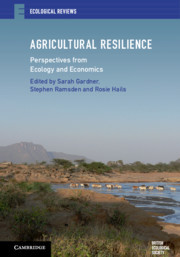Description
Agricultural Resilience
Perspectives from Ecology and Economics
Ecological Reviews Series
Coordinators: Gardner Sarah M., Ramsden Stephen J., Hails Rosemary S.
Offers an interdisciplinary exploration of resilience in agriculture, and implications for producers seeking to adapt to change and uncertainty.
Language: English
Subject for Agricultural Resilience:
Agricultural Resilience
Publication date: 05-2019
404 p. · 17.4x24.7 cm · Paperback
Publication date: 05-2019
404 p. · 17.4x24.7 cm · Paperback
Agricultural Resilience
Publication date: 05-2019
362 p. · 17.8x25.3 cm · Hardback
Publication date: 05-2019
362 p. · 17.8x25.3 cm · Hardback
Description
/li>Contents
/li>Biography
/li>
Agriculture as a social-ecological system embraces many disciplines. This book breaks through the silos of individual disciplines to bring ecologists and economists together to consider agriculture through the lens of resilience. It explores the economic, environmental and social uncertainties that influence the behaviour of agricultural producers and their subsequent farming approach, highlighting the importance of adaptability, innovation and capital reserves in enabling agriculture to persist under climate change and market volatility. The resilience concept and its relation to complexity theory is explained and the characteristics that foster resilience in agricultural systems, including the role of biodiversity and ecosystem services, are explored. The book discusses modelling tools, metrics and approaches for assessing agricultural resilience, highlighting areas where interdisciplinary thinking can enhance the development of resilience. It is suitable for those researching sustainable agriculture or those engaged in agricultural policy decisions and analysis, as well as students of ecology, agriculture and socioeconomics.
1. Introducing resilience Sarah M. Gardner and Stephen J. Ramsden; Part I. Biodiversity, Ecosystem Services and Resilience in Agricultural Systems: 2. Complexity and resilience in agriculture Sarah M. Gardner; 3. Biodiversity and agriculture David Tilman; 4. Determining the value of ecosystem services in agriculture Rosemary S. Hails, Rebecca Chaplin-Kramer, Elena Bennett, Brian Robinson, Gretchen Daily, Kate Brauman and Paul West; 5. Resilience in agricultural systems Stephen J. Ramsden and James Gibbons; 6. Building resilience into agricultural pollination using wild pollinators Neal Williams, Rufus Isaacs, Eric Lonsdorf, Rachel Winfree and Taylor Ricketts; 7. Conflicts and challenges to enhancing the resilience of small-scale farmers in developing economies Richard Ewbank; 8. Modern biotechnology and sustainable intensification: chances and limitations Rolf Meyer; 9. Pastoralism, conservation and resilience: causes and consequences of pastoralist household decision-making Katherine Homewood, Marcus Rowcliffe, Jan De Leeuw, Mohamed Y. Said and Aidan Keane; Part II. Integrating Biodiversity and Building Resilience into Agricultural Systems: 10. Delivering sustainability in agriculture: some implications for analysis Ian Hodge; 11. The resilience of agricultural landscapes characterised by land sparing versus land sharing Dave Abson, Kate Sherren and Joern Fischer; 12. Ecological-economic modelling for designing cost-effective incentives to conserve farmland biodiversity Martin Drechsler and Frank Wätzold; 13. Viability analysis as an approach for assessing the resilience of agroecosystems Sophie Martin; 14. Integrating economics and resilience thinking: the context of natural resource management in Australia Michael Harris, Graham Marshall and David Pannell; 15. Integrating biodiversity and ecosystem services into European agricultural policy: a challenge for the common agricultural policy Allan Buckwell; 16. Ecosystem-service based metrics of sustainability as tools for promoting conservation and food security Jonathan R. B. Fisher and Peter Kareiva; 17. Conclusions on agricultural resilience Sarah M. Gardner, Stephen J. Ramsden and Rosemary S. Hails.
Sarah M. Gardner works at the interface of ecology and environmental economics. She has worked with agricultural policymakers, land managers and farmers for over twenty years as adviser, researcher and lecturer. Her current work at GardnerLoboAssociates involves the design of data management systems for the livestock sector.
Stephen J. Ramsden is Associate Professor in Farm Business Management at the University of Nottingham. He has taught Agriculture for twenty-five years and worked on a wide range of research, with a central focus on farmers as decision makers.
Rosemary S. Hails is Director of Nature and Science at The National Trust, UK, and formerly Director of Biodiversity and Ecosystem Science at the Centre for Ecology and Hydrology. She leads the co-ordination of the Valuing Nature Programme (funded across the UK Research Councils), is Chair of the Advisory Committee on Releases to the Environment (ACRE) and a member of the Natural Environment Research Council (NERC) Science Board.
Stephen J. Ramsden is Associate Professor in Farm Business Management at the University of Nottingham. He has taught Agriculture for twenty-five years and worked on a wide range of research, with a central focus on farmers as decision makers.
Rosemary S. Hails is Director of Nature and Science at The National Trust, UK, and formerly Director of Biodiversity and Ecosystem Science at the Centre for Ecology and Hydrology. She leads the co-ordination of the Valuing Nature Programme (funded across the UK Research Councils), is Chair of the Advisory Committee on Releases to the Environment (ACRE) and a member of the Natural Environment Research Council (NERC) Science Board.
© 2024 LAVOISIER S.A.S.




